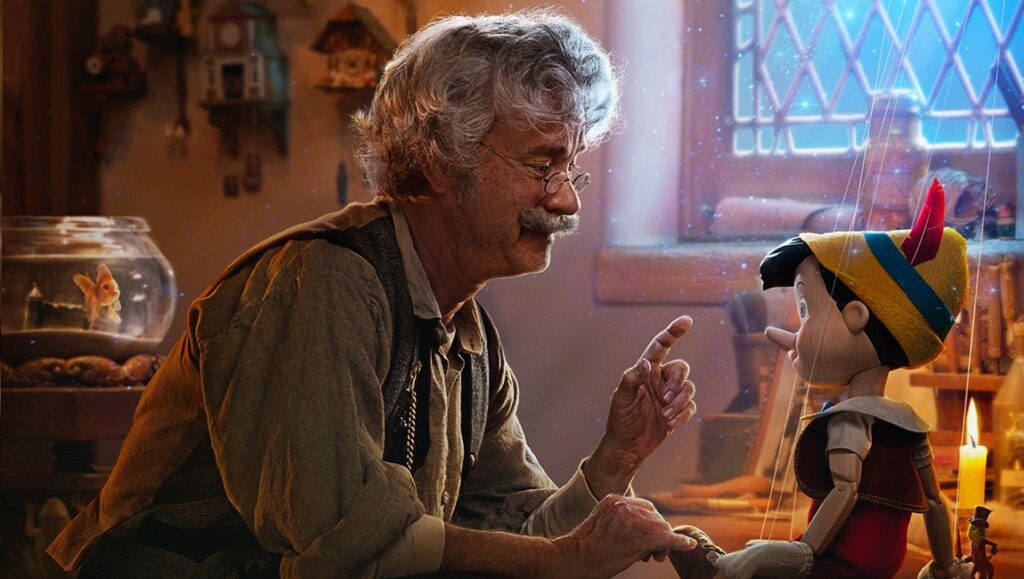Pinocchio is a fascinating late-period work from Zemeckis, one that takes in the full scope of his career as he wills us to believe in the uncanny illusion he crafts.
Robert Zemeckis’ Pinocchio — much like the original Italian fantasy novel of the same written in the late 1800s, and its famed animated adaptation from the ’40s — is, superficially speaking, a heartwarming children’s story about a wooden marionette who’s brought to life one fateful evening by a magical Blue Fairy. This newly produced lifeform (whose nose also grows whenever he lies) looks authentic, and even faithfully acts like how a “real boy” should; yet, he isn’t and wishes to change that. He goes on a number of grand misadventures — in the Disney version, he’s partnered with a talking cricket who becomes his conscious (in the book, he kills him almost immediately) — and learns a series of important life lessons, eventually becoming legitimately human through hard work and virtuous character. He saves his only family member from impending doom (being eaten by a whale), and is rewarded justly; after all, that’s what happens to the good little Tuscan boys who listen and tell their mothers the truth.
But at its core, it’s also, simultaneously, a melancholy tale of a lonely old man who constructs a phony child in order to replace a real one, a broken soul whose isolation leads him to wish life upon this inanimate object. Since this is his creation, it will obviously do whatever its master orders it to do. The figurine-turned-human will love its designer unconditionally, like a dog or pet would with its master — but also provide emotional feedback that suggests a more complex logic backing its actions. Geppetto, played here by Zemeckis stalwart Tom Hanks, could serve as a stand-in for the director (as could the main character in his last feature-length effort), a man whose recent work has seen him create lifelike replicas of human beings’ mannerisms and movements as a way to cope with the destructive ways he’s mistreated and abandoned the real thing. He, like Geppetto, has constructed a reproduction of reality — plopping an animated Pinocchio (and others) into a live-action setting — that’s so faithful that it can seamlessly enter and interact with it. Zemeckis wants us to believe in the illusion until it becomes natural, or until we accept it as such; “almost real” or “real enough,” at least in Zemeckis’ eyes, is basically the same thing.
Integration-wise, this is a pretty easy notion to accept: there’s a tangible weight to the ways these animated characters maneuver around DP Don Burgess’ precise frames, ducking and diving around micro- and macro-scenic details to make their presence viscerally felt. Pinocchio’s jerky animations and plasticky sheen create an uncanny effect amidst the live-action backdrops, lending the sense that he’s clearly never actually there, but the effect is close enough — at least when compared to Tom Hanks sporting a white wig and rocking an awful Italian accent — that it’s at least a little bit unsettling to see him dance about so casually. Which, considering how strangely absurdist and melancholy the source material is, this level of discomfort is a welcome addition; if anything, the text allows Zemeckis to unabashedly indulge in some of his more sinister tendencies, like stroking his ever-pervasive (if a tad contemptuous) worldview that modern society is an inherently amoral realm filled with hucksters and deceivers who lurk around every corner. Here, that perspective manifests in the form of malicious villains who either swindle our protagonist — like the anthropomorphic fox Honest John (equally as unnerving of an effect) and strong-man Stromboli — or outright alter his physical appearance, like The Coachman who pedals empty trills on Pleasure Island. This is, as one would expect, a relatively faithful adaptation of the Walt Disney property, with each scene stretched and bloated for maximum spectacle value, following a strict predestined path.
Except in this version, Pinocchio’s fate remains somewhat ambiguous. He and Geppetto live happily ever after, that much hasn’t been changed (Zemeckis isn’t a sadist, just a puckish prankster). Yet, during his closing remarks, narrator Jiminy Cricket — voiced by Joseph Gordon-Levitt, whose profound dopiness as an actor is put to good use here — skips over a particularly noteworthy detail: if Pinocchio finally became a real boy after that eventful day. Which, as Jiminy notes, may or may not actually matter in the grand scheme of things: what matters is if Pinocchio is real “at heart,” a notion that seems to supersede any other discernible qualities associated with liveliness. To Zemeckis, Pinocchio’s humanity isn’t intrinsically tied to his morality; that’s important, but not especially convincing. If anything, there needs to be a steadfast belief — from Pinocchio, from the viewers, and from even Zemeckis himself — that these digital effects can come close enough to reproducing reality that their artificial nature no longer matters. By the time the end credits of this strange and rather singular late-period motion picture begin to roll, it really doesn’t.
You can currently stream Robert Zemeckis’ Pinocchio on Disney+.
Part of Robert Zemeckis: Movie Magician


Comments are closed.